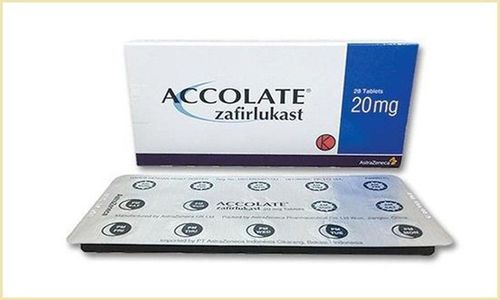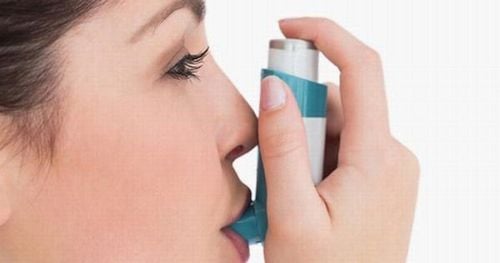This is an automatically translated article.
The article is professionally consulted by Master, Doctor Nguyen Huy Nhat - Department of Medical Examination & Internal Medicine - Vinmec Da Nang International General Hospital.
Bronchial asthma is an increasingly common disease today, it has a significant impact on the physical and mental health of patients every time an asthma attack occurs. This is a chronic, incurable condition, so controlling asthma is the best way for people with asthma.
1. What is bronchial asthma?
Asthma (also known as asthma) is a respiratory disease characterized by chronic inflammation of the airways. The bronchi of people with bronchial asthma are inherently very sensitive, when exposed to irritating factors, it will react violently, manifested by symptoms such as shortness of breath, wheezing, chest tightness and cough.Depending on the level of stimulation of the bronchioles and depending on the location of each patient, the asthma attack manifests in different severity.
Asthma is usually not curable, but its symptoms can be controlled by the patient's adherence to treatment.
2. Causes of bronchial asthma
There are many causes for the onset of an asthma attack in patients with bronchial asthma, including:Allergens: The most common cause. Inhalation allergens: Usually house dust, pollen, mold, animal hair, cigarette smoke, bugs living in mattress, ... Can also be industrial substances such as: metal dust , gasoline fumes, paint fumes,... Food allergens: Seafood (shrimp, crab, fish, shellfish,...), eggs, chicken, peanuts. Medicines: Some drugs can also trigger asthma attacks, such as aspirin, penicillin,... Infectious agents: Upper respiratory tract infections such as rhinitis, sinusitis, pharyngitis, Tonsillitis, ... is one of the causes of asthma in patients with atopic allergies. Non-allergic triggers: Heredity: Someone in the family has asthma. Psychological factors: Anxiety, stress, psychological trauma,... Sexual disorder.

Có rất nhiều nguyên nhân gây khởi phát cơn hen ở bệnh nhân hen phế quản
3. How is bronchial asthma treated?
Asthma is difficult to cure completely, however, if the patient adheres well to treatment, this asthma can be controlled. In addition to medication for treatment, patients need to incorporate active lifestyle changes so that asthma management can be done effectively.Drug treatment: Medications used to treat asthma include: Long-term asthma control drugs: Inhaled corticosteroids, long-acting beta-agonists, combination inhalers, Leukotrienes, Theophylline,... This is the main measure in the treatment of bronchial asthma, it helps to control daily asthma and limit the occurrence of acute asthma attacks. Quick-acting relievers: Short-acting beta-agonists, oral/intravenous corticosteroids, or Ipratropium can be used to improve symptoms of an acute asthma attack immediately. Allergy therapy may be instituted in patients with allergic bronchial asthma. Positive lifestyle changes: Exercise regularly in the morning, 30 minutes a day, practice gentle exercises, suitable for your physical condition such as walking, yoga,... Eat sensibly and nutritiously. fruit and green vegetables. Avoiding factors that can trigger asthma attacks such as: avoiding exposure to dust and smoke, regularly cleaning the house, ... The choice of specific treatment method depends on age, symptoms, weakness. asthma triggers and control factors. Patients need to be monitored and re-examined, so that the doctor can assess the patient's asthma control level, thereby making appropriate adjustments to the treatment plan in the next time.
4. Common obstacles in asthma control and management

Quản lý bệnh hen suyễn có hiệu quả hay không, nó còn phụ thuộc vào nhiều yếu tố
Mistakes in using the inhaler to control the patient's asthma. Patient does not hold breath long enough while inhaling medication: A common mistake patients often make is not holding their breath long enough while inhaling medication, usually holding for less than 10 seconds, which prevents the medication from reaching the target of action or reach the target of action but not enough dose to promote the therapeutic effect. When inhaling the inhaler, the patient often lets the tongue cover the tip of the tube, so when spraying, the drug only enters the tongue but not the bronchioles. As a result, the spray will never get into the lungs. With drugs that are inhaled many times, patients often have a habit of exhaling while the mouth is still holding the inhaler, which causes steam from the mouth to flow into the medicine, causing moisture to make the medicine lose its effectiveness for the next few times. after inhalation without the patient's knowledge. When using the inhaler a few times, the patient is in remission, the patient stops using these inhalers: Once the asthma is under control, the number of asthma attacks decreases, this does not mean an acute asthma attack. will no longer appear. Patients need to understand that asthma control is something that must be done daily and forever for patients with bronchial asthma, so that even if the frequency of asthma attacks has been greatly reduced, inhale the controller medications. Asthma is a daily task that patients must do to control asthma attacks and minimize acute asthma attacks. Usually, the doctor assigns the patient to go home to regularly use the inhaler - inhaler, but when he returns, the patient is afraid of inhaling forever, so he should quit or limit inhalation to inject or take medicine. Patients still do not understand that asthma is a disease in the bronchi, so when injecting or taking medicine, the amount of medicine in the blood disperses throughout the body, reaching the bronchi very little. On the contrary, where there is no damage such as the brain, heart, etc., the drug is received. Not checking medicine regularly: Many people use medicine but do not regularly check the amount of medicine left in the bottle, leading to no medicine entering the bronchi to control asthma attacks, especially for relievers, many when suddenly there is an acute asthma attack that requires medication, it has already gone, putting the patient in a dangerous situation.: Spray in the air and keep away from the mouth: This makes the use of the medicine meaningless because of the amount The drug does not reach the lungs, so it cannot work. Lie down when spraying: This not only prevents the medicine from reaching the lungs, but also makes it difficult to breathe back for the user. To tilt the inhaler, spray into the nasopharynx: These actions cause the medicine to stay in the mouth, tongue and throat, the medicine cannot reach the lungs to work, and can cause sore throat if the medicine contains corticosteroids Spray 1 more puff because of cough after taking the medicine. : This is completely wrong, because coughing after taking the medicine is a normal reflex and the amount of medicine is not lost after a few days. hi ho, so if you spray 1 more spray, it will cause an overdose. Obstacles due to drugs The aerosols - sprayers are specially designed so the cost is often very high. For low-income patients, they rarely use these types of devices to relieve acute asthma or prevent asthma attacks, but they often use oral or injectable drugs. Oral or injectable drugs cause many dangerous side effects for patients because they have systemic effects and their ability to control asthma is not high. Currently, Vinmec International General Hospital has an asthma screening package for patients with bronchial asthma. Vinmec's asthma screening package helps:
Screening for early detection to promptly control and treat the disease Perform clinical examination, take medical history, measure respiratory function, otolaryngology and clinical examination bronchial filter. This asthma screening package can be used by any patient, especially those at high risk for asthma including:
Having recurrent episodes of wheezing or wheezing Coughing infrequently, especially increased nighttime or early morning awakening Cough or wheezing after physical activity Difficulty breathing that persists during a certain season of the year Cough, wheezing, or shortness of breath following exposure to respiratory allergens (house dust, mold...) or irritants (paints, oils, perfumes...) Ever had a cold that led to pneumonia or lasted for more than 10 days Have had a diagnosis of asthma, but it's not clear. When registering for the Asthma Screening Package, customers will receive:
01 appointment with an Allergist - Clinical Immunology 01 screening tests: Measurement of respiratory function Measuring FeNo Otolaryngoscopy Allergen Testing Asthma as well as other respiratory diseases are examined and treated by a team of highly qualified and experienced doctors at Vinmec hospital. Including Master, Doctor Nguyen Huy Nhat with many years of experience in the field of respiratory disease treatment at Hue Central Hospital, Hoan My General Hospital, .. before being a doctor of General Internal Medicine Department. Vinmec Da Nang International General Hospital.
You can go directly to Vinmec International General Hospital system or register online HERE.














